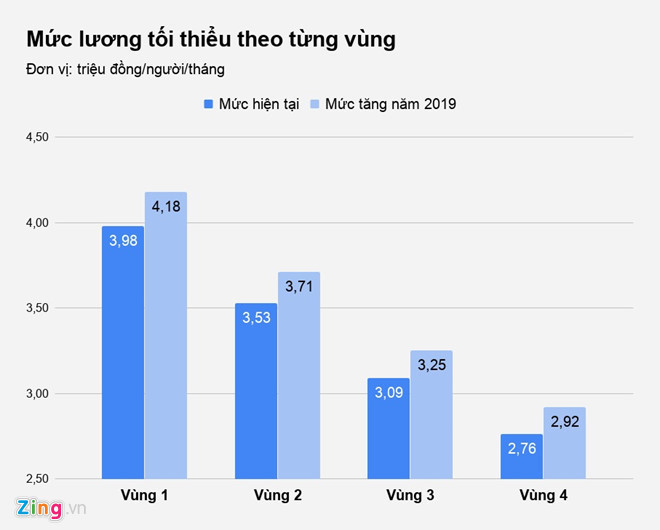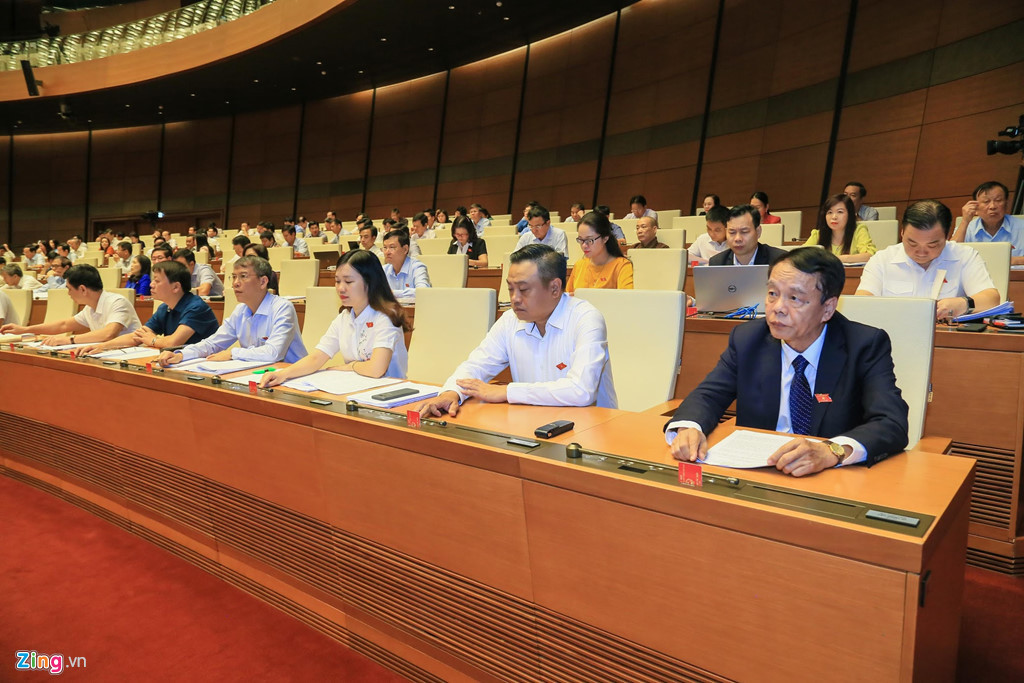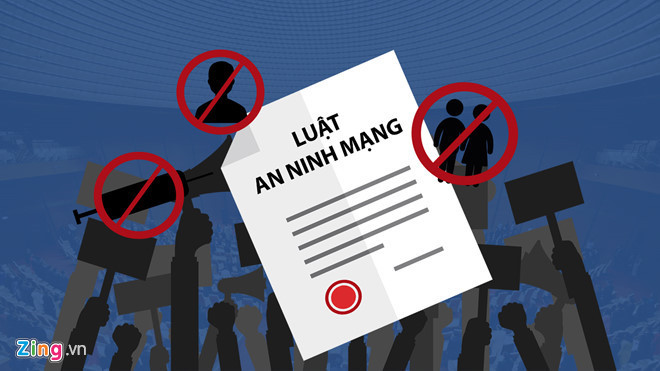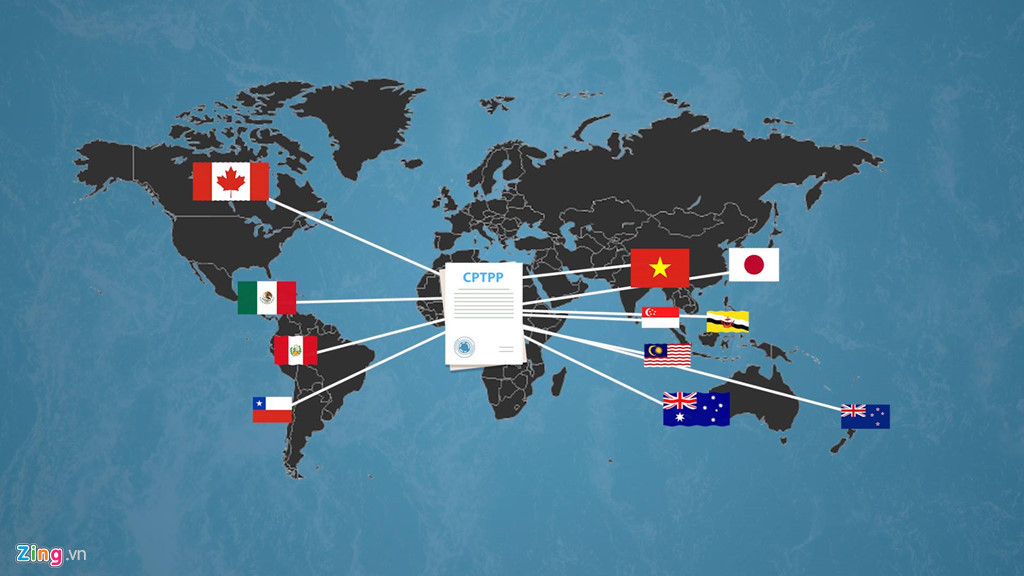Outstanding policies effective from January 2019
Many prohibited behaviors in cyberspace, increasing regional minimum wages, CPTPP Agreement... are policies applied from January 1, 2019.
Regional minimum wage
Decree No. 157/2018/ND-CP of the Government regulating regional minimum wages from 2019 will take effect from January 1. Accordingly, employees working under labor contracts will receive a higher minimum wage from VND160,000 to VND200,000 depending on the region.
|
| Regional minimum wage increased from January 1, 2019. Photo:Quang Thang. |
Article 24, Clause 3 stipulates that denunciations that are not within the jurisdiction of settlement will not be processed. In case the denunciation is not within the jurisdiction of settlement and is sent to many places at the same time.
|
| The Law on Denunciation (amended) was passed by the National Assembly on June 12, 2018. Photo:Ming Army. |
In which there are organizations and individuals with the authority to resolve or have provided instructions but the denouncer still sends the denunciation to a place without the authority to resolve, the place receiving the denunciation will not process it.
Clause 1, Article 25 stipulates that when receiving information containing a denunciation but the name and address of the denouncer are unknown or the denouncer cannot be identified or the name of another person is used to make the denunciation, the competent agency, organization or individual shall not handle it.
But if the information has clear denunciation content, with specific documents and evidence, the receiving place will inspect and check according to its authority or transfer it to a competent place for inspection and check to serve management work.
The time limit for handling a complaint is no more than 30 days from the date of receipt of the complaint (60 days under the old law). In complicated cases, the time limit for handling the complaint may be extended once, but not more than 30 days. In especially complicated cases, the time limit for handling the complaint may be extended twice, each time not more than 30 days.
Many behaviors are prohibited in cyberspace.Effective from January 1, the Law on Cyber Security with 7 chapters and 43 articles regulates activities to protect national security and ensure social order and safety in cyberspace; and the responsibilities of relevant agencies, organizations and individuals.
Notably, 6 groups of behaviors are strictly prohibited in cyberspace, including:
1. Using cyberspace, information technology, and electronic means to violate national security and social order and safety; anti-state activities; distorting history, insulting religion, discriminating based on gender or race; inciting riots, disrupting security, and disturbing public order.
|
| 6 groups of behaviors prohibited online. Photo:Friend. |
Providing false information, insulting, slandering; violating economic management order, prostitution, social evils, human trafficking and inciting, enticing, and inciting others to commit crimes.
2. Conducting cyber warfare, cyber attacks, cyber terrorism, cyber espionage, cyber crimes; causing incidents, attacks, intrusions, taking control, distorting, interrupting, stopping, paralyzing or destroying important information systems related to national security.
3. Producing, using tools, means, software or engaging in acts that hinder or disrupt the operation of computer networks or telecommunications networks; disseminating computer programs that harm the operation of computer networks, telecommunications networks or electronic devices; illegally accessing computer networks, telecommunications networks or electronic devices of others.
4. Resisting or obstructing the activities of cybersecurity forces; illegally attacking, disabling or rendering ineffective cybersecurity measures.
5. Taking advantage or abusing cybersecurity protection activities to infringe upon national sovereignty, interests, security, social order and safety, legitimate rights and interests of organizations and individuals, or for personal gain.
6. Other acts using cyberspace to infringe upon national security, social order and safety, the legitimate rights and interests of organizations and individuals, or violate the provisions of this law.
Article 9 of the law also stipulates the handling of violations of cybersecurity. Specifically, anyone who violates the provisions of this Law shall, depending on the nature and severity of the violation, be subject to disciplinary action, administrative sanctions, or criminal prosecution. If causing damage, compensation must be paid in accordance with the provisions of law.
Cut nearly 100 tax linesThe Comprehensive and Progressive Agreement for Trans-Pacific Partnership (CPTPP), ratified by the National Assembly on November 12, 2018, will take effect from January 14, 2019.
|
| The CPTPP Agreement helps improve the business environment. Photo:Hoang Hiep. |
Before Vietnam, the six countries that ratified CPTPP were Mexico, Japan, Singapore, New Zealand, Canada and Australia. The agreement took effect for these six countries on December 30, 2018.
Vietnam commits to cutting nearly 100% of tax lines; commits to public procurement activities; commits to the state-owned enterprise sector; commits to allowing workers to establish workers' organizations that are not necessarily affiliated with the Vietnam General Confederation of Labor; commits to environmental issues, e-commerce...
Vietnam will amend a number of laws and decrees during the legal review process to comply with the provisions of the CPTPP, directly applying many commitments, especially in the fields of opening up services and investment.
Institutional reform helps improve the business environment, maintain and increase foreign and domestic investment, focusing on export products to take advantage of the CPTPP market, helping to improve the level and competitiveness of Vietnamese goods; on the other hand, attracting investment with high technology content.
Exporting and importing enterprises within the CPTPP bloc will not have to pay taxes, which will help shift the supply chain and Vietnamese enterprises will have the conditions to participate. Regarding exports, there will also be benefits, first of all from markets without FTAs such as Canada, Mexico, Peru, and even the Japanese market.
In addition, many laws and decrees also took effect from January such as: Law on National Defense, Law on Physical Training and Sports, Law amending a number of laws related to planning, Decree detailing regulations on implementing grassroots democracy regulations in the workplace...






